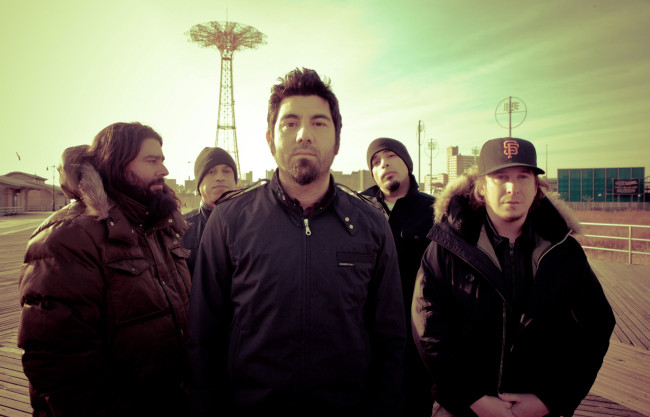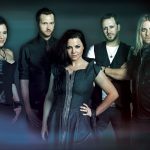Deftones and Refused rock the Sands Bethlehem Event Center on Aug. 2

From a press release:
One of the first groups to alternate heavy riffs and screamed vocals with more ethereal music and hushed singing, Deftones spawned a fair amount of imitators in their wake. Swedish rock band Refused also influenced many hardcore punk acts that would come after them.
Now these originators are on tour together, making their first appearance at the Sands Bethlehem Event Center on Tuesday, Aug. 2 at 7 p.m.
Tickets, which are $45 for GA and $65 for reserved seats, go on sale this Friday, April 1 at 10 a.m. and can be purchased at sandseventcenter.com, the Event Center box office (77 Sands Blvd., Bethlehem), ticketmaster.com, all Ticketmaster outlets, or by phone at 800-745-3000.
Although the group was more heavy metal-based early on, the early ’90s saw Deftones expand their sound, and it landed the group a recording contract with Madonna’s label, Maverick.
The band’s debut, “Adrenaline,” was issued in October of 1995. While the album wasn’t an instant success, Deftones built a dedicated fan base the old fashioned way – by touring relentlessly.
With sales of “Adrenaline” topping 200,000 copies, expectations were high for their sophomore release, “Around the Fur.” Issued in October of 1997, it more than delivered, catapulting the band to the top of the alt-metal mountain on the strength of such MTV/radio faves as “My Own Summer (Shove It)” and “Be Quiet and Drive (Far Away).”
A seven-track import EP, 1999’s “Live,” was issued as a stopgap release as Deftones began work on their third studio effort. “White Pony” was eventually released in June of 2000 and proved to be one of the most eagerly anticipated heavy rock releases of the year. The album was another success (debuting at No. 3 on the album charts), and it showed the quintet unafraid to experiment with its sound.
Eagerly anticipated by both fans and critics alike, “Deftones” dropped in May 2003 and spawned the single “Minerva.” The quintet then embarked on the “Summer Sanitarium Tour” with Metallica and Linkin Park. Deftones ended up peaking at No. 2 on the Billboard 200, and the band took a well-deserved break for rest and side projects. In October 2005, Deftones issued a two-disc set of B-sides and rarities before returning with a new studio full-length, “Saturday Night Wrist,” a year later.
Unfortunately, tragedy struck the band in the latter part of the new millennium when a car accident left bassist Chi Cheng in a coma and caused his eventual passing. The band did release their sixth and seventh albums, “Diamond Eyes” (2010) and “Koi No Yokan” (2012) and continued to tour while working on their latest release, “Gore,” set to come out in April of this year.
Refused wasn’t just ruminating about the lasting impact of popular culture when it began its 1998 album “The Shape of Punk to Come” with a lyric about classics never going out of style – it was also taking stock of its own turbulent existence, which met an ignominious end later that year in front of 50 kids at a basement show in a Virginia college town. Indeed, Refused came and went before the true power of its music could be understood, even by its own members. And in the ensuing years, the band cast a giant shadow over the world of underground rock, with the boundary-exploding “Shape” rising to all-time legendary status as it influenced a new generation of musical revolutionaries.
After Refused, frontman Dennis Lyxzen, drummer David Sandstrom, guitarist Kristofer Steen, and bassist Magnus Flagge started anew in a host of different bands – sometimes in various combinations of playing together, sometimes making music they didn’t intend anyone else to hear. All the while, “Refused was this weird albatross,” says Lyxzen. “I could play a great show and walk out into the crowd afterward, and someone would come up and say, ‘I love Refused.’ For a long time, playing together again wasn’t even on the table.”
An offer to reunite for the 2012 Coachella Valley Music and Arts Festival in the California desert spurred the band back into action, and the triumphant tour that followed found Refused playing to heretofore inconceivably massive crowds around the world. Initially reluctant, Lyxzen says, “I thought it’d be Coachella and nine more shows. That’d be it. Then we started practicing, and we wound up doing 82 shows. Now we’re back with a new record, so it must have felt right.”
“Freedom” explodes out of the speakers with opening track “Elektra,” as Lyxzen’s throat-shredding declaration that “nothing has changed” catapults Refused into the 21st century. The group started contemplating new Refused music within the first four months of the reunion tour, a process greatly aided by the fact that Sandstrom, Steen, and Flagge had already been writing together informally for several years under the auspices of a new vocal-less band.
Steen recalls, “I said to David, ‘Why are we pursuing this experimental project that has a lot of overlap with Refused? Why don’t we turn these into Refused songs instead?’ And he was like, ‘Yeah! That’s what I think too!’” Adds Sandstrom, “When Dennis wasn’t involved, the music was a lot more dense and dynamic, with a lot of stuff going on. When we started thinking we were writing for Dennis, we made decisions that suited him and created room for him.”
For the members of Refused, the impending release of “Freedom” and its accompanying tour have returned them firmly to the present tense. Says Steen, “I could not have imagined this would have happened. I’d have said it was impossible, and never in a million years would I do it. It was just something about the fact that Refused grew so much while we didn’t exist.” “It’s not a reunion anymore,” Lyxzen insists. “This is one of the most radical things we’ve ever done, both musically and lyrically.”



